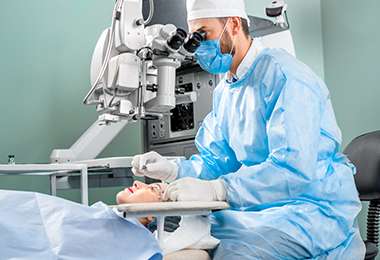Oculoplastic Surgery
Oculoplastic Surgery is a term that refers to a variety of surgical procedures that can involve the eyelids, eye sockets, eyebrows, tear ducts, or other areas around the eye. Oculoplastic Surgery can be both cosmetic and medically necessary as some conditions can affect a person’s vision and their appearance at the same time.
Conditions that Oculoplastic Surgery Treats
- Ptosis
- Entropion/Ectropion
- Problems caused by Thyroid Diseases such as Graves’ Disease
- Skin cancers or other growths that are in or around the eyes
- Weakness around the eyes or eyelids caused by Bell Palsy
- Tear Duct problems
- Injuries to the eyes or the area around the eyes
- Birth defects of the eyes or orbit (bone around the eye)
- Cosmetic problems, such as excess upper eyelid skin, bulging lower lids
How to Prepare for Oculoplastic Surgery
A full consultation with your doctor will provide all you need to know about your scheduled surgery. Many oculoplastic surgeries are performed on an out-patient basis, which means you can return home the same day of surgery. However, that doesn’t mean the procedure isn’t serious or that proper pre-and post-surgical care isn’t necessary. The following steps will help you prepare for surgery:
- Find out if your insurance company will cover the procedure your doctor recommends. A thorough understanding of the benefits of the surgery will help you decide if your out-of-pocket expenses equal potential benefits.
- Make an appointment with your primary care physician for a pre-operative clearance. Patients taking certain medications, including over-the-counter medications and supplements may need to avoid or limit those substances before surgery.
- Schedule a preoperative appointment with the surgeon after you have been cleared by your primary physician. This will give you an opportunity to discuss questions or concerns that have come up since the initial consultation.
- Make arrangements for at least eight hours of aftercare, including transportation home after the surgery.
- Long-term after-care depends on the patient and the type of surgery. Your doctor will provide complete instructions that are easy to follow at home. Typically, patients are asked to limit activity for the first 48 hours and use cool compresses to help minimize swelling and pain. In most cases, heavy lifting and exercise should be avoided for up to two weeks. Acetaminophen is recommended for pain relief though your doctor may prescribe something stronger.
Health risks of oculoplastic surgery are rare, but every procedure can result in complications. Scarring, ptosis (drooping of the eye) and vision loss are the more serious risks. The other risk is not being satisfied with the aesthetic effects of the surgery. A frank discussion with your surgeon will help set realistic expectations and ensure you are happy with the results of your procedure.
